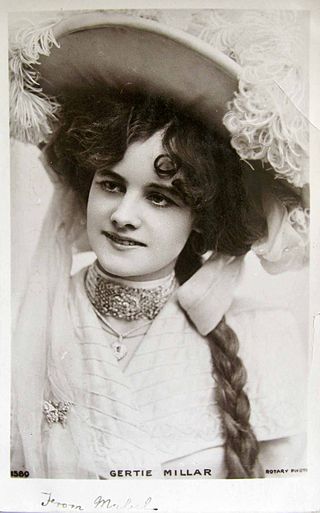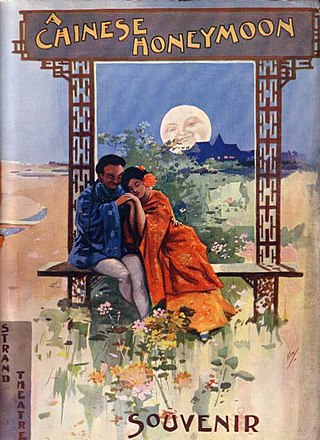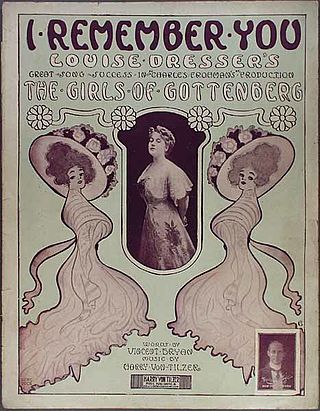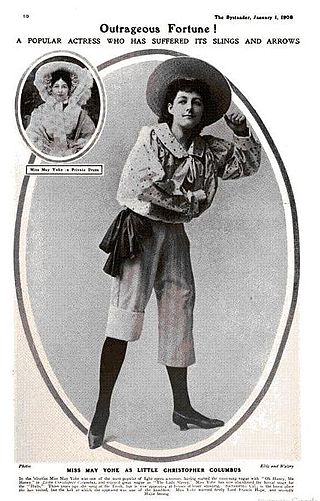
Lionel John Alexander Monckton was an English composer of musical theatre. He became Britain's most popular composer of Edwardian musical comedy in the early years of the 20th century.

San Toy, or The Emperor's Own is a "Chinese" musical comedy in two acts, first performed at Daly's Theatre, London, on 21 October 1899, and ran for 768 performances. The book was written by Edward Morton, and the musical score was written by Sidney Jones with lyrics by Harry Greenbank and Adrian Ross. Additional songs were written by Lionel Monckton. The cast included Marie Tempest, Scott Russell, Huntley Wright and Rutland Barrington.

The Circus Girl is a Edwardian musical comedy in two acts with a book by James T. Tanner and Walter Apllant (Palings), lyrics by Harry Greenbank and Adrian Ross, music by Ivan Caryll, and additional music by Lionel Monckton.

The Messenger Boy is a musical comedy in two acts by James T. Tanner and Alfred Murray, lyrics by Adrian Ross and Percy Greenbank, with music by Ivan Caryll and Lionel Monckton, with additional numbers by Paul Rubens. The story concerns a rascally financier who tries to discredit a rival in love; it takes place in London, Cairo and Paris.

Gertrude Ward, Countess of Dudley, known as Gertie Millar, was an English actress and singer of the early 20th century, known for her performances in Edwardian musical comedies.

The Orchid is an Edwardian musical comedy in two acts with music by Ivan Caryll and Lionel Monckton, a book by James T. Tanner, lyrics by Adrian Ross and Percy Greenbank, and additional numbers by Paul Rubens. The story concerns marital mix-ups and the quest of a wealthy man for a $2,000 Peruvian orchid to be sent to France. When foul play keeps the flower from reaching its destination, it is discovered that a nearly identical orchid is growing in the garden of the horticultural college.

A Chinese Honeymoon is a musical comedy in two acts by George Dance, with music by Howard Talbot and additional music by Ivan Caryll and others, and additional lyrics by Harry Greenbank and others. One song that originated in the show was "Mister Dooley" which became famously associated with The Wizard of Oz for decades, when John Slavin, in the title role, interpolated the song for much of the first year of its run.

The Girls of Gottenberg is an Edwardian musical comedy in two acts by George Grossmith, Jr. and L. E. Berman, with lyrics by Adrian Ross and Basil Hood, and music by Ivan Caryll and Lionel Monckton. P. G. Wodehouse's personal papers indicate that he wrote the lyrics for one song, "Our Little Way", but this was not included in the libretto of show, and he was not credited as a lyricist. Set in Germany, the comedy of the show is largely based on stereotypes of the German people and their culture as seen seen through a British lens.

An Artist's Model is a two-act musical by Owen Hall, with lyrics by Harry Greenbank and music by Sidney Jones, with additional songs by Joseph and Mary Watson, Paul Lincke, Frederick Ross, Henry Hamilton and Leopold Wenzel. It opened at Daly's Theatre in London, produced by George Edwardes and directed by James T. Tanner, on 2 February 1895, transferring to the Lyric Theatre on 28 May 1895, and ran for a total of 392 performances. The piece starred Marie Tempest in the title role, Hayden Coffin, Letty Lind, Leonora Braham, Eric Lewis, Maurice Farkoa, Marie Studholme, and Louie Pounds. It also had a Broadway run at the former Broadway Theatre from 21 December 1895 through 8 February 1896.

The School Girl is an Edwardian musical comedy, in two acts, composed by Leslie Stuart with a book by Henry Hamilton and Paul M. Potter, and lyrics by Charles H. Taylor and others. It concerns a French school girl from a convent, who goes to Paris to help her lovesick friend. Through mistaken identity, she learns secrets that help her at the Paris stock exchange and ends up at a students' ball in the Latin Quarter. All ends happily.

George Grossmith Jr. was an English actor, theatre producer and manager, director, playwright and songwriter, best remembered for his work in and with Edwardian musical comedies. Grossmith was also an important innovator in bringing "cabaret" and "revues" to the London stage. Born in London, he took his first role on the musical stage at the age of 18 in Haste to the Wedding (1892), a West End collaboration between his famous songwriter and actor father and W. S. Gilbert.

The Spring Chicken is an Edwardian musical comedy adapted by George Grossmith, Jr. from Coquin de Printemps (1897) by Jaime and Duval, with music by Ivan Caryll and Lionel Monckton and lyrics by Adrian Ross, Percy Greenbank and Grossmith. The story takes place in Paris and Château de Malmaison.

The Girl from Kays is a musical comedy in three acts, with music by Ivan Caryll and book and lyrics by Owen Hall. Additional songs were by Paul Rubens, Howard Talbot, Adrian Ross, Percy Greenbank and others. The farcical story concerns a misguided kiss.

To-Night's the Night is a musical comedy composed by Paul Rubens, with lyrics by Percy Greenbank and Rubens, and a book adapted by Fred Thompson. Two songs were composed by Jerome Kern. The story is based on the farce Les Dominos roses by Alfred Hennequin and Alfred Delacour.

Little Christopher Columbus is a burlesque opera in two acts, with music by Ivan Caryll and Gustave Kerker and a libretto by George R. Sims and Cecil Raleigh. It opened on 10 October 1893 at the Lyric Theatre in London and then transferred to Terry's Theatre, running for a total of 421 performances, which was a very successful run at the time. May Yohé created the title role, and Furneaux Cook and E. J. Lonnen were in the cast. Mabel Love, Geraldine Ulmar and Florence St. John joined the cast as replacements.
Monte Carlo is an Edwardian musical comedy in two acts with a book by Sidney Carlton, music by Howard Talbot and lyrics by Harry Greenbank. The work was first performed at the Avenue Theatre in London, opening on 27 August 1896. The New York production opened on March 21, 1898 at the Herald Square Theatre.

The Girl from Utah is an Edwardian musical comedy in two acts with music by Paul Rubens, and Sidney Jones, a book by James T. Tanner, and lyrics by Adrian Ross, Percy Greenbank and Rubens. The story concerns an American girl who runs away to London to avoid becoming a wealthy Mormon's newest wife. The Mormon follows her to England, but she is rescued from a bigamous marriage by a handsome actor.

The Dancing Mistress is a musical comedy with music by Lionel Monckton, book by James T. Tanner and lyrics by Adrian Ross and Percy Greenbank. It depicts the fortunes of a school dancing mistress who is dismissed and finds fortune and happiness in Switzerland. The piece ran in the West End of London in 1912 and 1913, and toured the British provinces in 1914.

Kissing Time, and an earlier version titled The Girl Behind the Gun, are musical comedies with music by Ivan Caryll, book and lyrics by Guy Bolton and P. G. Wodehouse, and additional lyrics by Clifford Grey. The story is based on the 1910 play, Madame et son Filleul by Maurice Hennequin, Pierre Véber and Henry de Gorsse. The story is set in contemporary France, with a glamorous actress at the centre of a farcical plot of imposture, intrigue and mistaken identity.

Lady Madcap is an Edwardian musical comedy in two acts, composed by Paul Rubens with a book by Paul Rubens and Nathaniel Newnham-Davis, and lyrics by Paul Rubens and Percy Greenbank. The story concerns a mischievous Earl's daughter who holds a ball at her father's castle without permission, pretends to be her own maid, and causes general confusion.























